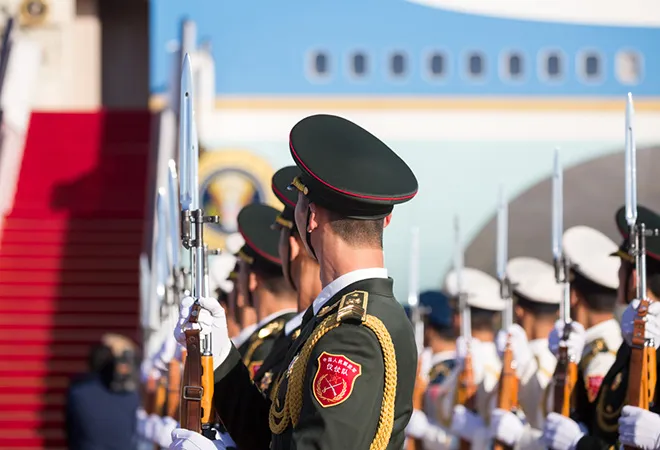-
CENTRES
Progammes & Centres
Location
India should know that the OBOR scheme is not about CPEC and Pakistan; but in fact its primary goal is to integrate the rich European economy with that of China’s.

President Xi Jinping has just hosted a mega show to sell China's massive Eurasian connectivity scheme, known variously as the One Belt One Road (OBOR), or the Belt Road Initiative (BRI), to the world. Present at the occasion were presidents and prime ministers, and leaders of other parts of the world and, more disconcertingly, our neighbouring countries as well.
If you get the impression that India was isolated in its boycott of the meeting, you are not wrong. But this has been an avoidable injury. The basis of New Delhi's rigid opposition to OBOR has never been quite clear. Speaking at the Raisina Dialogue in March 2016, foreign secretary S. Jaishankar had implicitly criticised China for building connectivity without "consultative processes," and hardwiring the choices for its participants.
Subsequently, New Delhi raised the issue of the China Pakistan Economic Corridor (CPEC) passing through PoK. Last week, in listing out his objections to the scheme, official spokesman Gopal Baglay said that "no country can accept a project that ignores its core concerns on sovereignty and territorial integrity."
But this sounded more of a pretext to oppose OBOR than anything else; India has never seriously sought the return of Gilgit-Baltistan and has wanted the LoC as an international boundary.
Actually a lot of the hardwiring is already done. 2017 will see over 2,000 trains (estimated) travel from a dozen Chinese cities to over 20 European destinations on newly built lines and tunnels in Central Asia. Pipelines and railroads have already shifted the economic orientation of the region from Russia to China. Southeast Asia is undergoing a similar process through new rail lines overlaying the traditional maritime routes. In the Indian Ocean Region (IOR), Chinese companies have built, are building and, in many cases, operating, ports in (Kyaukpyu) Myanmar, (Hambantota) Sri Lanka, (Gwadar) Pakistan, (Bagamayo) Tanzania, (Lamu) Kenya. As part of this, China has made strategic investments in central and eastern Europe as well.
It is important to understand what OBOR is and what it is not. Its primary goal is to integrate the rich European economy with that of China, not about CPEC and Pakistan, which are just sideshows of the ambitious scheme.
The shorter term goal is for China to emerge as the dominant regional power in its neighbourhood, where it is already the leading economic presence. Linked to this is the compulsion of protecting Chinese maritime commerce, particularly oil, in the IOR.
India lacks the resources to match China's ambitious plans for Eurasia, but it is directly affected by Chinese money pouring into its neighbourhood and the marked surge in Chinese naval activity in the IOR since 2014. Beijing has now established a base in the Djibouti and you can be sure that Gwadar, is a Chinese naval facility in all but name. And this is just the beginning.
After connectivity, Beijing is moving on the second leg of its strategy — an economic policy to make China a developed country. For this China intends to sit at the top of the global manufacturing value chains instead of being a low-level aggregator. Beijing is investing hundreds of billions of dollars to gain the global pole position in areas like integrated circuits, Artificial Intelligence, robotics, bio-pharma, electrical cars and so on. The European connection is the key to this, since high-end products need a rich market.
A major problem with the Indian response is that it concentrates exclusively on the geopolitical leg of OBOR — Pakistan, Sri Lanka and so on. But the scheme is primarily about geo-economics. By staying out of it, India risks being systematically frozen out of business opportunities in an enlarging area that is integrating with the Chinese economy around the world.
India cannot stop the scheme, but it can hamper it in many ways. We are not without clout in our region, and we possess a vast and growing market for Chinese products. India's geographical location is a huge advantage, especially for the maritime leg of the scheme in the IOR
These factors can be parlayed into a hard-headed negotiation with the Beijing to insist that the benefits of participating in OBOR must be shared. But, first, New Delhi needs to stop whining and learn to cherry-pick the OBOR menu.
True, it is a Chinese scheme, funded by their banks and largely executed by Chinese companies. But Beijing now realises that it is too big and complex to be done on its own. If China is open to working with other countries, as Xi's speech seemed to suggest, it may yet be possible to get them to understand how their favourite phrase "win-win" cooperation can really be win win.
This commentary originally appeared in Hindustan Times.
The views expressed above belong to the author(s). ORF research and analyses now available on Telegram! Click here to access our curated content — blogs, longforms and interviews.

Manoj Joshi is a Distinguished Fellow at the ORF. He has been a journalist specialising on national and international politics and is a commentator and ...
Read More +